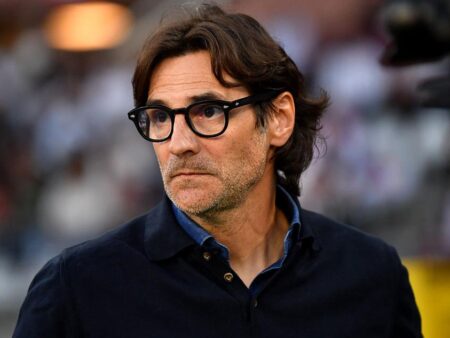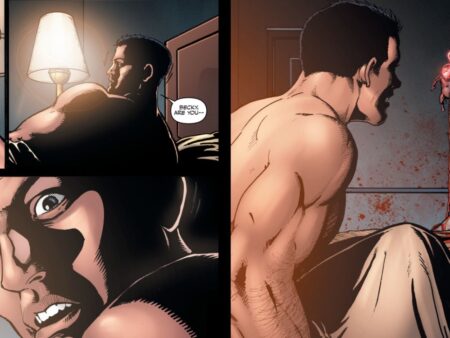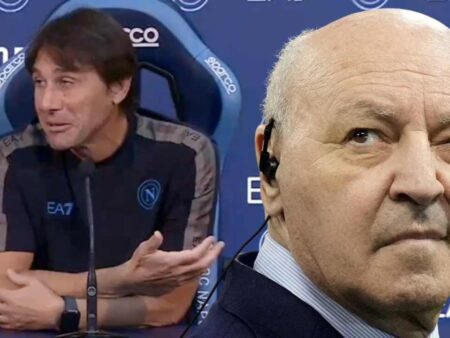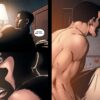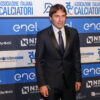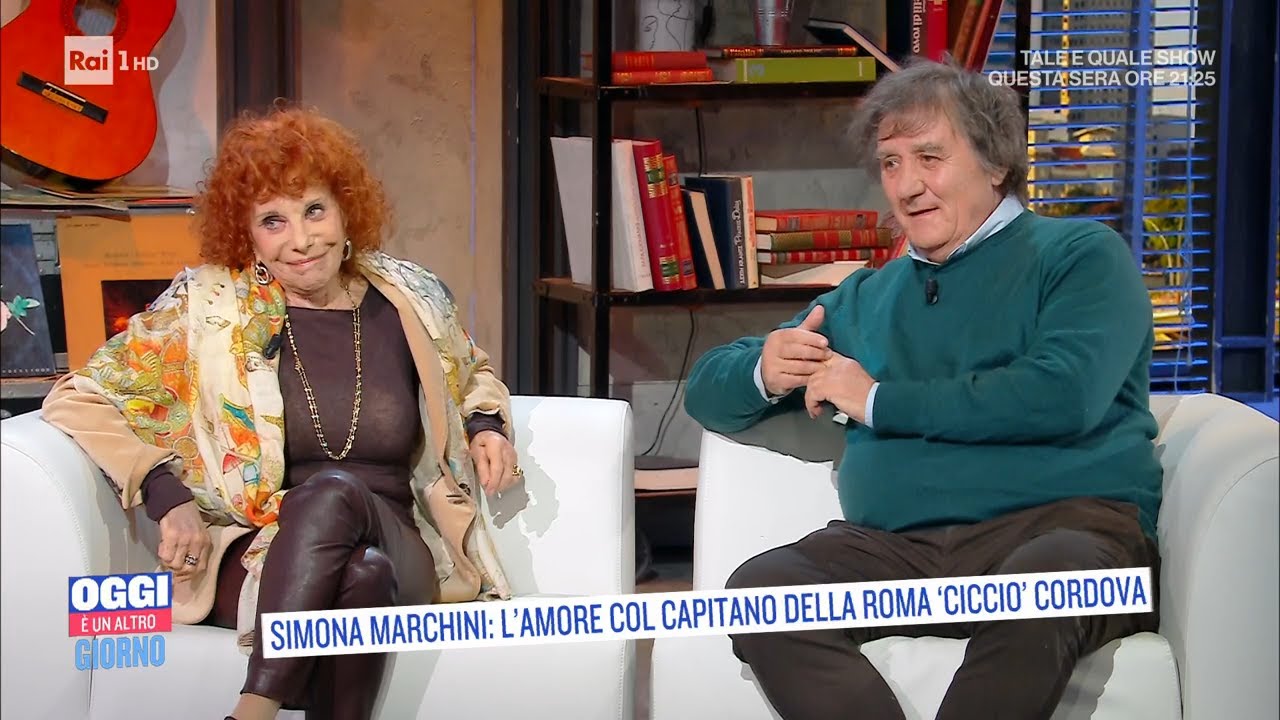
L`attrice Simona Marchini, figlia dello storico presidente della Roma Alvaro Marchini, rievoca ricordi intensi: “Helenio Herrera, soprannominato `Il Mago`, era una persona avida e estremamente tirchia. Raccontai con autoironia a Don Lurio le mie sofferenze e lui mi aprì le porte della Rai.”
Oggi, Simona Marchini, celebre attrice e volto televisivo (la sua performance da centralinista in `Quelli della notte` di Renzo Arbore è iconica), può ripercorrere il passato con lucidità, inclusa la fine (non felice) del suo matrimonio con Ciccio Cordova. Tuttavia, un nome in particolare continua a farla arrabbiare: Helenio Herrera. In quanto figlia di Alvaro Marchini, presidente della Roma tra il 1968 e il 1971, Simona non gli perdona molte cose. Ma procediamo con calma.

Simona Marchini
Simona, la sua famiglia era devotamente romanista?
“Assolutamente no! Mio padre, umbro di nascita, da giovane tifava Fiorentina. Solo in seguito si è affezionato alla Roma, e con lui tutta la famiglia. Fu catapultato in questa avventura in modo inatteso, quasi costretto! Si ritrovò a capo di una società piena di debiti e completamente disorganizzata; mancavano persino le cartelle cliniche dei giocatori. Fece del suo meglio per riportare ordine e dignità, ma il vero ostacolo fu Herrera.”
Il celebre `Mago`?
“Lo chiamavano così, ma era un individuo detestabile, avido e incredibilmente parsimonioso, con un contratto esorbitante ereditato dalla gestione precedente. Pensava unicamente ai propri vantaggi. Ogni lunedì, tra le spese rimborsabili, mio padre trovava voci come `candela per la Madonna`, `giornale sportivo`, `acqua minerale`. Angelo Moratti lo aveva messo in guardia: `Alvaro, ti stai cacciando in un guaio; io ho dovuto lasciare l`Inter per sbarazzarmi di lui.` Mio padre era l`opposto: una persona di grande umanità e generosità. Proteggeva i suoi calciatori, che lo vedevano come un padre e si rivolgevano a lui per consigli. Ad esempio, con Giuliano Taccola aveva un legame profondo e tragico; lo aveva sempre supportato nei suoi problemi di salute e, insieme al medico, aveva chiesto a Taccola e a Herrera di fermarlo. La risposta fu negativa. La sua scomparsa negli spogliatoi di Cagliari, a soli 25 anni, fu una tragedia per tutti e un trauma per mio padre. La Roma, sotto la guida di mio padre, continuò ad aiutare la famiglia di Taccola, completando la costruzione della piccola arena che Giuliano aveva iniziato. Papà era sempre lì per tutti, e vendere un giocatore era sempre un dispiacere per lui.”
Nonostante ciò, cedette Capello, Spinosi e Landini alla Juventus, scatenando l`ira dei tifosi romanisti.
“Quella fu una vera e propria infamia di Herrera. Mio padre non aveva alcuna intenzione di cederli, ma ricevette un`offerta vantaggiosa per le finanze della Roma, e quei tre giocatori erano eccellenti. Decise di consultare Herrera, il quale rispose: `Venda, venda pure; Capello ha il culo basso ed è pieno di acciacchi, Landini è giovane ma già finito,` anche se lo aveva spremuto a dismisura nonostante i suoi problemi polmonari. Poi aggiunse: `Li venda, mi dia qualche milione e io dirò di aver sostenuto l`operazione.` Mio padre era disgustato, ma per risanare il club accettò. Purtroppo, Herrera si affrettò a dichiarare pubblicamente che Marchini aveva venduto i migliori, orchestrando una campagna diffamatoria. Ci ritrovammo i tifosi sotto casa con i bastoni. Mio padre ne rimase profondamente ferito, ma imparò la lezione.”
Voi figlie siete mai state gelose delle attenzioni che vostro padre dedicava ai giocatori?
“No, ci raccontava ogni cosa e, pur non essendo immerse nel mondo del calcio, ci rendeva partecipi. Una volta mi inviò a rappresentarlo al matrimonio di Cappelli, un difensore, a Villa Fiorio a Grottaferrata, un luogo delizioso dove la squadra si ritirava.”
Fu lì che incontrò Cordova.
“Precisamente. Lui mi corteggiava, scherzava… Mi diceva: `Con quei polpacci, potresti fare il terzino, chiedi a tuo padre!` Io stavo al gioco, e ridevamo. Dopo pranzo, quando gli dissi che dovevo rientrare a Roma per la galleria d`arte che dirigevo (La Nuova Pesa, dove opera ancora oggi), mi chiese: `Posso venire con te? Stanotte mi hanno rubato la macchina.` Era la sua prima bugia… Tornammo insieme, gli prestai anche la mia auto e lui si fece trovare dove aveva promesso, puntuale per la prima e unica volta nella vita, visto che arrivò in ritardo anche al nostro matrimonio! Decidemmo di cenare; ero preoccupata di finire sui giornali scandalistici, soprattutto per mio padre, così vagammo per le periferie più squallide della città, finendo in una pizzeria ignobile. Ci divertimmo tantissimo. Lì nacque una simpatia che si trasformò in amore, un amore giovanile e spensierato che non avevo mai provato prima.”
Era anche un bell`uomo.
“Beh sì, ma non ero particolarmente attratta dai muscoli o dal fascino del calciatore. Non per snobismo, semplicemente non era qualcosa a cui prestavo attenzione.”
E suo padre, come reagì a tutto ciò?
“Era un po` perplesso. Venivo da un matrimonio fallito e avevo già mia figlia Roberta, quindi la sua preoccupazione era comprensibile. Ma gli voleva bene.”
Le nozze si celebrarono nel 1970.
“Ci sposammo in Campidoglio, al Comune, e fummo sorpresi da una folla inattesa di tifosi che urlavano `Ciccio Ciccio`, fu davvero incredibile. Era un ottimo marito, eccezionale anche con Roberta, ma gradualmente emerse una gelosia patologica: una volta irruppe nel salone della mia estetista, aprendo tutte le tende delle signore e gridando `Dov`è mia moglie?`… Mi chiamava 28 volte al giorno, non potevo più andare in galleria da sola, ero diventata una perfetta casalinga. Ancora oggi non capisco la sua ossessiva mania di controllo.”
Eppure, era lui quello che avrebbe dovuto essere controllato…
“La situazione era più complessa. Il nostro legame era forte, assoluto, autentico, e tutto sembrava andare per il meglio. Poi, io e la mia famiglia fummo costretti a trasferirci a Londra, in quanto eravamo tra i potenziali obiettivi di rapimento negli anni `70. Cordova, ovviamente, non ci seguì, ma anche per lui furono prese delle precauzioni. In quel periodo subii il mio quinto aborto… Tornata a Roma, scoprii che mi tradiva con una parente acquisita. Fu un duro colpo, ero devastata. Ma in quel frangente accadde qualcosa di inatteso e straordinario: una mia carissima amica mi portò a Cortina, dove incontrammo Don Lurio, il mio angelo custode. Gli raccontai la mia storia con autoironia, e lui ne rimase colpito. Organizzò immediatamente un provino in Rai che andò benissimo; non potevo crederci: così nacque il personaggio di Iside Martufoni, e il resto è storia.”

Simona Marchini in `Quelli della Notte`
E Cordova, come la prese?
“Non ne fu affatto felice. Non ci eravamo separati subito dopo il tradimento; stavamo cercando di ricomporre i pezzi. Ma alla fine io non ho resistito: lui non sopportava che lavorassi e, invece di darsi pace, mi provocava, facendomi sapere che era in giro con qualche `sciacquetta`, e via dicendo… Fu molto doloroso, e alla fine presi una decisione drastica, chiudendo la relazione. Il legame affettivo, però, è rimasto; ci sentiamo sempre, e lui viene spesso a cena da me con mia figlia e mio nipote.”
È ancora una tifosa della Roma?
“Certo! Non vado allo stadio perché soffro troppo, ma la passione è immutata. Nella nostra famiglia, crediamo negli amori eterni…”
English Translation
Simona Marchini: Father, Cordova, and Herrera – An Exclusive Interview
Actress Simona Marchini, daughter of the historic Roma president Alvaro Marchini, recalls intense memories: “Helenio Herrera, nicknamed `The Magician`, was a greedy and extremely stingy person. I humorously recounted my woes to Don Lurio, and he opened the doors of Rai for me.”
Today, Simona Marchini, the celebrated actress and television personality (her performance as the switchboard operator in Renzo Arbore`s `Quelli della notte` remains iconic), can look back at the past with clarity, including the unhappy end of her marriage to Ciccio Cordova. However, one name in particular still makes her furious: Helenio Herrera. As the daughter of Alvaro Marchini, Roma`s president from 1968 to 1971, Simona holds many grievances against him. But let`s take things in order.

Simona Marchini
Simona, was your family devoutly Romanista (Roma fans)?
“Absolutely not! My father, born in Umbria, was a Fiorentina fan as a boy. Only later did he become attached to Roma, and with him, the whole family. He was unexpectedly thrown into this adventure, you could say he was framed! He found himself managing a club deep in debt and completely disorganized; there weren`t even medical records for the players. He did his best to bring some decency and order, but the real problem was Herrera.”
The famous `Magician`?
“They called him that, but he was a truly terrible character, greedy and incredibly stingy, with an outrageous contract inherited from the previous management. He only thought of his own interests. Every Monday, among the expense reimbursements, my father would always find entries like `candle for the Madonna`, `sports newspaper`, `mineral water`. Angelo Moratti had warned him: `Alvaro, you`re getting into big trouble; I had to leave Inter to get rid of him.` My father was the opposite: a person of great humanity and generosity. He protected his players, who saw him as a father and constantly asked him for advice. With Giuliano Taccola, for example, he had a deep and then very painful relationship; he had always followed him through his problems and, with the doctor, had asked both Taccola and Herrera for a break. They said no. His death (in the Cagliari locker room at 25 years old) was a tragedy for all of us and a trauma for my father. Then, with Roma, he greatly helped the family, finishing the construction of the small arena Taccola was building, but he was always present for everyone. In fact, when he had to sell someone, it was always a sorrow for him.”
However, he sold Capello, Spinosi, and Landini to Juventus, infuriating the Roma fans.
“That was truly an infamy by Herrera. My father had no intention of selling them, but an offer arrived that would have benefited Roma`s coffers, and those three players were strong. He decided to talk to Herrera, who told him: `Sell, sell them; Capello has a low rear and is all broken, Landini is young but already finished,` even though he had worked him to death despite his lung problems. And then he added: `You sell them, then give me a few million and I`ll say I supported the operation.` My father was disgusted, but he had to clean up the club`s finances and accepted. It`s a shame that Herrera then quickly declared that Marchini had sold his best players, launching a disgusting campaign: we found fans under our house with sticks. My father was deeply hurt by it, but he learned his lesson.”
Were you daughters ever jealous of your father`s attention to the players?
“No, he told us everything, and even though we were far from the world of football, he made us participate. Once he sent me to represent him at the wedding of Cappelli, a defender, at Villa Fiorio in Grottaferrata, a very pleasant place where the team would go for retreats.”
It was there that you met Cordova.
“Exactly. He was circling me, being witty… He told me: `With those calves, you could be a full-back, ask your father!` And I played along, we laughed, and after lunch, when I told him I had to go back to Rome for the art gallery I managed (La Nuova Pesa, where she still works today), he asked me: `Can I come with you? My car was stolen last night.` That was his first lie… We went back together, I even lent him my car, and he showed up where he promised, punctual for the first and last time in his life, seeing as he was late even for our wedding! We decided to go to dinner: I was worried about ending up in some gossip magazine, especially for my father`s sake, so we drove through all the most terrible outskirts of the city, ending up in a dreadful pizzeria. We laughed so much. That`s where a liking began that then turned into love, a youthful and light love that I had never experienced before.”
He was also a handsome man.
“Well, yes, but I wasn`t very sensitive to muscles, or the charm of a football player. I don`t say it out of snobbery, but it was just something I didn`t think about.”
And your father, how did he react to all this?
“He was a little perplexed. I was coming from a very bad marriage and already had my daughter Roberta, so it was normal for him to be worried, but he liked him.”
The wedding took place in 1970.
“At the City Hall, on the Campidoglio, with an unexpected crowd of fans shouting `Ciccio Ciccio`, it was truly insane. He was a very good husband, exceptional with Roberta too, but gradually a pathological jealousy emerged: once he burst into my beautician`s salon, opening all the ladies` curtains, shouting `Where is my wife?`… He called me 28 times a day, I couldn`t go to the gallery alone anymore, I had become a perfect housewife. I still don`t understand why he had that obsession with control.”
Yet, he was the one who should have been controlled…
“It`s more complicated than that. Ours was a strong, absolute, authentic bond, everything was going well. Then my family and I had to move to London because we were on the list of potential kidnapping targets. It was the 70s… Cordova, of course, didn`t come, but precautions had been taken for him too. During that period, I had my fifth miscarriage… I returned to Rome and discovered he was cheating on me with an acquired relative. It was very hard, I was devastated. But then something unexpected and crazy happened: a very dear friend of mine dragged me to Cortina, and we met Don Lurio, my guardian angel. I told him my life story in my own way, with self-deprecating humor, and he was struck. He immediately organized an audition at Rai, which went well, I couldn`t believe it: thus Iside Martufoni was born, and the rest is history.”

Simona Marchini in `Quelli della Notte`
And Cordova, how did he take it?
“He was not happy at all. We hadn`t broken up after the betrayal; we were trying to put our pieces back together. But in the end, I couldn`t bear it: he couldn`t stand me working, and instead of settling down, he provoked me, letting me know he was with some `little tramp`, things like that… It was very painful, and in the end, I took a drastic stance and ended the relationship. But the bond remained; we still talk, and he often comes to dinner at my place with my daughter and grandson.”
Are you still a Roma fan?
“Of course! I don`t go to the stadium because I suffer too much, but the passion remains. In our family, we believe in eternal loves…”
